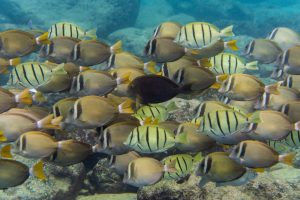Herbivore Management
What are herbivores and why are they important for coral reefs?
Fish and other animals that primarily eat plants, seaweed, and algae are called herbivores. There are many species of herbivorous fishes in Hawaiʻi. The most commonly fished herbivores are parrotfish (uhu), surgeonfish (manini, kole, kala, etc.), and chubs/rudderfish (nenue). These species are not only important subsistence resources, but also play a vital role in the ecosystem.
Coral reefs rely upon abundant populations of herbivores to remain healthy and resilient. Herbivorous fish help maintain the balance in coral reef ecosystems by grazing the reef and preventing corals from becoming overgrown with algae. Read more about the importance of herbivores here.
Why are regulations needed?
Regulations are used to ensure responsible and sustainable fishing practices. By limiting the number and/or size of fish that are caught at one time, communities can benefit from more fish in the future and have plenty of food on the table for family and friends. Regulations ensure fair and sustainable fishing opportunities for Hawaiʻi’s present and future fishers.
Are these island-wide rules or statewide rules?
This rulemaking effort is a statewide effort to address widespread concerns about declining reef health and herbivorous fish populations.
The Holomua Marine Initiative will be working towards place-based planning for individual areas throughout the state with public input about the specific needs of particular places. If you would like to see different rules in your place, please participate in that process as well.
The process so far…
- November 2020: Initial scoping sessions were held for the islands of O‘ahu, Maui, Kaua‘i, East Hawai‘i, and West Hawai‘i. A total of ten meetings all together were hosted to gather feedback and comments on herbivorous fishes and invertebrates. Public scoping notes can be found at the bottom of this page.
- March 2021: Six additional scoping meetings were scheduled to target specific groups that included fishers, the Native Hawaiian Gathering Rights Association, and the non-profit organization Kuaʻāina Ulu ʻAuamo (KUA). Scroll to the bottom of this page to access the public scoping notes for these sessions.
- December 2021: Following the initial scoping meetings, the Statewide Herbivore Management Strategy was updated based on feedback and three additional statewide scoping meetings were hosted to share the revised proposal. Click on the following links to access scoping summary notes from: Dec 11th, Dec 13th, Dec 15th, and the online feedback. Frequently asked questions (FAQ) from these statewide scoping meetings can also be found HERE.
- December 8, 2022: DAR requested the Board of Land and Natural Resources (BLNR) to approve holding statewide public hearings on the proposed rule amendments of select species of herbivorous fish, including minimum harvest size adjustments for manini and kole, and bag limits for uhu and kala. You can view the full submittal and proposed amendments HERE. The Board deferred voting on the measure and requested that DAR update the proposed amendments to include accommodations addressing the concerns raised by the commercial uhu and kala fishers in order to allow further discussion on the issues through the public hearing process.
- May 12, 2023: After including options for commercial fishery accommodations for uhu and kala as appealed by the BLNR, DAR submitted a second request for approval to hold public hearings on the revised harvesting amendments for uhu, kala, kole, and manini. The Board approved DAR’s request to hold public hearings on the revised rulemaking proposal, you can view the full BLNR submittal with the updated proposed amendments HERE.
- August 2023: Public hearings for the Statewide Herbivore Rules were held in the beginning of August for O‘ahu, Kaua‘i, Hawai‘i island, and Maui Nui. Click HERE to view the official public hearing notice along with the proposed amendments. View the recorded public hearings on DAR’s YouTube channel at the links below:
- December 2023: Following the August 2023 statewide public hearings, DAR biologists and staff held many meetings to discuss the next steps forward. All feedback and testimony submitted were carefully considered, and a revised proposal was drafted and submitted to BLNR for request of final adoption of rules on December 7-8th, 2023. The agenda item for this was continued to December 15th, 2023, in which it was approved by the BLNR. View the full land board submittal HERE to see the final proposed amendments. You can also watch the BLNR meeting recording on their YouTube channel, the agenda item starts at ~5:14:00.
- February 2024: The proposed rules for uhu, kala, manini, and kole were signed by Governor Josh Green, M.D. and took effect on February 22, 2024. The complete rules package can be found here.
Please sign up for our mailing list here to receive future updates.
Any additional thoughts or questions? Talk to us!
- East Hawai‘i- Troy Sakihara (808) 961-9532 [email protected]
- West Hawai‘i – Chris Teague (808) 327-6226 [email protected]
- Maui – Russell Sparks (808) 243-5832 [email protected]
- O‘ahu – Stacia Marcoux (808) 753-5175 [email protected]
- Kaua‘i – Heather Ylitalo-Ward (808) 274-3346 [email protected]
Click below to read about our Sustainable Herbivore Management Plan
View Herbivore Information Flyer
View Frequently Asked Questions (FAQ) from the December 2021 Herbivore Scoping Sessions
Access and view previous public herbivore scoping notes below:
Statewide Herbivore Scoping Notes: December 2021
Targeted/Hosted Scoping Notes: March 2021
Hawai‘i Island Fishers Scoping Notes
Kuaʻāina Ulu ʻAuamo (KUA) Network Scoping Notes
Native Hawaiian Gathering Rights Scoping Notes
General Public Scoping Notes: 2020






